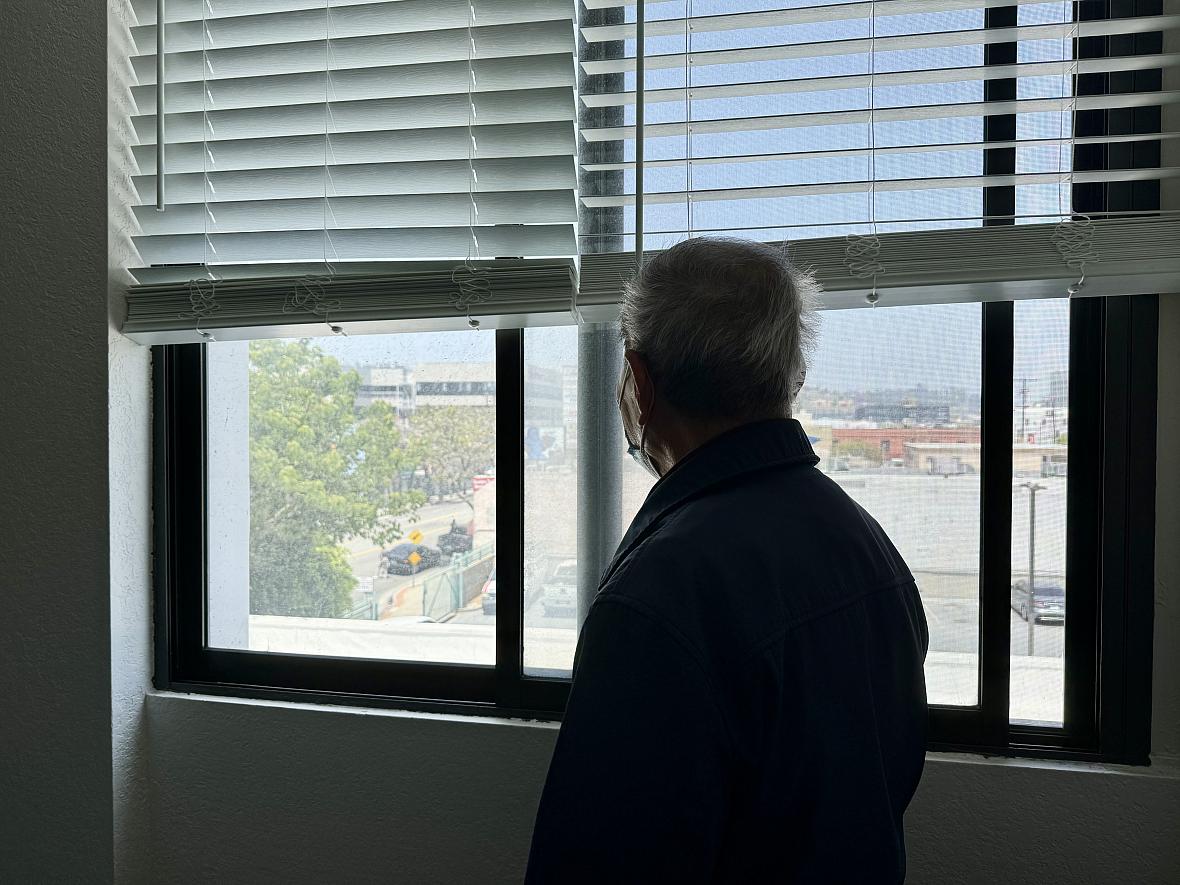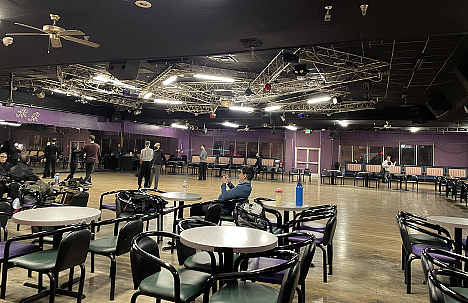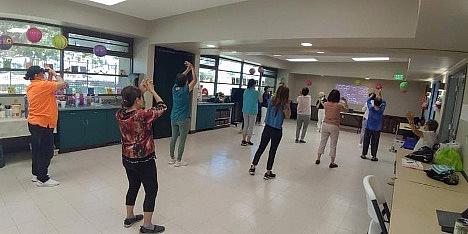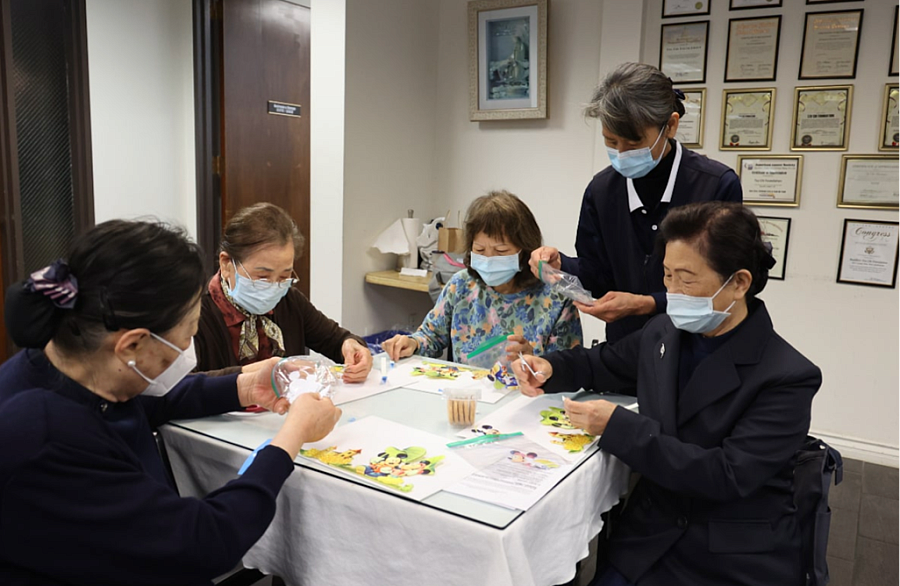Loneliness and Isolation Among Chinese Older Adults Exacerbated by Language Barriers
The story was co-published with the World Journal as part of the 2024 Ethnic Media Collaborative, Healing California.

John Feng, who is 91 years old, relies on Mandarin television programs to fill his everyday life.
Jian Zhao/World Journal
As the number of older Chinese adults in the United States grows rapidly, loneliness is expected to become an increasing public health concern in this population. Studies on the high prevalence of loneliness among Chinese older adults report that approximately 26% of this group experience feelings of loneliness, compared to 16.9% in the general older population in the U.S..
The mass shooting in Monterey Park on Lunar New Year in 2023 has drawn significant attention to the issues of isolation and loneliness in the elderly Chinese community. The gunman, 72-year-old Huu Can Tran, killed 11 people and wounded nine others after opening fire at a ballroom dance club popular among Chinese seniors.
Since Tran died from a self-inflicted gunshot wound, the exact motive behind the shooting may never be known. But the gunman has been described by his former friend as a loner who rarely had visitors and was typically alone. This description, along with accounts from other acquaintances, offers a fragmented portrait of a lonely, embittered man.
Dancing away the loneliness
Before the shooting, the elderly Chinese dancers in the ballroom were a hidden community.
Most of the people who came to dance lived alone, divorced or widowed. Dancing was their only social interaction,”said a survivor named Niu, who asked to be identified only by his last name..

The area marked in red is where Niu was standing when the gunman entered the dance club.
World Journal
When the shooting started, Niu was dancing near the entrance of the ballroom, just two meters away from the gunman. "People around me fell one by one. The floor was covered in blood," Niu recalls. After the shooting, he couldn’t sleep, and would get startled by loud noises outside.
However, to this day, Niu’s daughter is still unaware of what happened to her father and does not even know that he can dance.
"We don’t often talk or communicate. My daughter was born in America and educated in American way. She is independent, with her own ideas and own plans. Different than mine," Niu said.
Before moving to the U.S., Niu was a manager at a real estate company in China. He said he gave up everything to come to America, but things did not go well. His American dream was gradually overshadowed by language and cultural barriers. Later, he became a market vendor traveling between states to sell baubles, which left him very little time to spend with his daughter.
Niu has never discussed his traumatic experience with anyone else. "I basically don’t have any friends. First-generation immigrants are all busy working to make a living and don't have time to make friends," he said.
Linguistic Barriers
Chinese elder John Feng, who is 91 years old, also said, “I don’t have any friends."
Feng lives in Chinatown, one of the most densely populated areas in Los Angeles. The senior apartment building where he resides has 270 units, and nearly all the residents are Chinese.
“We have language barriers,” said Feng, who is from Shenzhen, China and speaks Mandarin. Most of the residents in the apartment building do not understand his language, and he also cannot understand theirs. To kill time, Feng relies on Mandarin television programs, that he managed to connect, to fill his everyday life. As long as he is at home, the TV is always on.
Feng said that even among Cantonese speakers, who are the most common in this apartment building, they may not understand each other. There are many dialects.
In China, there are 10 major dialects: Mandarin, Wu, Xiang, Yue, Hakka, Gan, Min, Jin, Hui, and Pinghua, representing 129 minor dialect variants.
These language differences create barriers to communication and add to feelings of loneliness.
Feng often stands by the window staring out? and has noticed an elderly resident who "sits in the courtyard downstairs from morning till night, day after day."
Having lived in America for over 30 years, Feng roasted ducks for a Chinese restaurant before retirement. He worked more than 10 hours a day, his busy schedule and household chores left him with no time for social life or the pursuit of English literacy.
Like Niu, Feng’s adult children live in Southern California. But they rarely meet only during important Chinese festivals. Feng also mentioned, "They have received American education and have very different thoughts and values from mine, so we don't know what to talk about when we are together."
Chinese Version of Loneliness
Like the many interpretations of Hamlet, loneliness is also experienced in various ways.
For most elderly Chinese, the estrangement from family is a key source of loneliness.
Unlike their American peers, Chinese elders tend to expect more support and interaction from their family and less from friends. A 2012 study found that the relationship between family support and loneliness was stronger for the Chinese elderly than the American elderly.
According to thestudy of 3,159 U.S. Chinese older adults in the Greater Chicago area,lacking companionship was the leading symptom of loneliness among U.S. Chinese older adults.
In a study of Chinese participants aged 60 and older, poor relationships with adult children and spouses was identified as a key factor contributing to loneliness. “The worst scenario is that children don’t visit their parents,” a Chinese participant said in the study.
As research has shown, parents and children in Chinese immigrant families often acculturate at a different pace and have different expectations, which in turn often create conflict, feelings of distance, or even alienation. In addition, Asian parents’ emphasis on academic performance often distances parents from their children, according to Pew Research Center.
A Hidden Corner
The chronic feeling of loneliness can have serious consequences for the health of older adults. Studies show that loneliness predicts greater physical, mental, cognitive health decline, lowered self-esteem, fear, and anxiety, and increases in mortality and suicidal ideation. A study, conducted on 3,159 U.S. Chinese older adults, found that loneliness was associated with poor global cognitive functioning in this population.
But the inner world of Chinese individuals is often difficult to perceive. "Saving Face”, a traditional Confucian concept, maintains that the purpose of social exchange is to enhance honor and social standing and to foster self-esteem and equilibrium within the community. Chinese older adults who have internalized this concept may be more reluctant to engage with their social network to share their negative emotions and life difficulties. These traditional cultural values can persist even after leaving the home country, potentially creating a fertile ground for loneliness.In Chinese culture, especially for men, expressing inner thoughts and emotions is often viewed as a sign of cowardice, a perspective deeply rooted in thousands of years of traditional patriarchal values.
A frequent older dancer who used to visit the dance club frequently where the mass shooting occurred said, “If men confide in others, they are often labeled as weak, which leads to their frustrations having no outlet and hatred growing within. Just like the gunman, it’s obvious that he had been living in desperation for a long time, and then came back to the dance club even after many years.”

A dance club in Alhambra
Jian Zhao/World Journal
Health care professionals are having problems to detecting the association between loneliness and adverse health outcomes.
“I feel it very bureaucratic, being questioned by the police, asking about my birthplace, educational background, and high school experience and so on” Niu recalled the time he received counseling after the shooting. Niu has also tried peer groups and pastors, but none of them worked for him.
Niu has tried peer groups and pastors, but none of them worked for him.
“We don’t share a cultural background. How can I expect to be understood?” Niu said.
But Niu’s reluctance to continue counseling was not only because of his skepticism about mental health support but also difficulty in accessing a counselor.
Due to the limited availability of Chinese -speaking counseling services, Niu had to drive over an hour and a half to reach the counseling center. Upon arrival, due to the limited number of counselors and tight schedules, he had to wait an additional hour before the meetings, and the entire session lasted less than an hour. He gave up after a few sessions.
Escalating Loneliness
Niu recently underwent a major heart surgery and spent two weeks alone in the hospital, an experience which only made his experience of loneliness worse.
“Living is worse than death,” Niu said in recalling those two weeks. Surrounded by tubes, wires and medical equipment, he faced a daily ordeal. "Whenever I closed my eyes, monsters and demons appeared before me. Being alone was terrifying.”
After returning home from the hospital, the loneliness grew worse. He struggled to manage on his own. His only reliable support came from a neighbor— who also lives alone—who helped cook meals for him.
Social Resources
There are programs that are trying to reach seniors like Niu.
The Program of All-Inclusive Care for the Elderly, or PACE, was established by Medicare to help independent seniors with complex medical needs. The program offers care coordination, transportation, social services, and meals for seniors in need of assistance. Californian elders can use this website to find a PACE program in their community.
However, due to language barriers, Chinese seniors may find it difficult to get the resources. Social worker Ling Wu, working in Los Angeles County, pointed out that, on one hand, it's challenging for Chinese seniors to be aware of or able to apply for these services; on the other hand, without a language matching system, Chinese seniors and Chinese-speaking volunteers cannot be paired. “In fact, many Chinese are interested in contributing to the community, but they were often excluded because of language barriers—volunteer training is only conducted in English as well,” Ling said.
To enrich the lives of older adults, local governments are also taking action. In San Gabriel Valley, where there is a significant Chinese population, cities such as Monterey Park,Arcadia, Walnut,Pasadena, etc., have set up various programs aiming at seniors at local community centers, including exercise, art, dance classes, as well as free health screenings and case management services to provide customized services for elders. To keep seniors informed about the latest events and information, Arcadia launched a monthly newsletter for those aged 50 and above, called Connection.
In addition, YWCA-SGV Senior Services offers nutritious meals to mobile older adults at senior centers throughout the San Gabriel Valley. They also provide home-delivered meals for homebound elders. Additionally, social workers check the safety and wellness of recipients during the weekly delivery of these meals. The cost is only around $3 for those aged 55 and above. To sign up for meals, call the Senior Services 24-Hour Message Line at (626) 214-9465.
Furthermore, there are non-profit organizations specifically targeting Chinese seniors. Tzu Chi El Monte Service Center holds regular events and activities tailored to the interests of Chinese seniors each month. They also invite experts in fields such as medicine, nutrition, floral decoration and pottery to share information and engage seniors both in hands-on and intellectual activities.

Elders were practicing Health Qigong at Tzu Chi El Monte Service Center
Courtesy: Tzu Chi El Monte Service Center

Elders put together a collage at Tzu Chi El Monte Service Center:
Courtesy: Tzu Chi El Monte Service Center:
“In most cases, Chinese seniors prefer to interact with members and social workers and who share a common cultural background. Chatting and simply spending time together with the group can significantly benefit their mood and health,” says Chen Jian, the head of the service center, who has been a volunteer for 35 years. He emphasizes the importance of seniors being active to interact with people.

But due to limited social workers, the coverage of their services cannot be well-rounded. Chen explains that young people need to work, especially under today’s high living costs. Most social workers are retired, like his team averaging around 60-70 years old. “Volunteering takes time, money, and effort; It is a labor of love and sometimes even requires personal financial contributions. The team works out of a sense of mission.” At 77, Chen works seven days a week, saying that aside from eating and sleeping, he spends over 90% of his time on this work.
Immediately following the Monterey Park mass shooting, the social workers at the Center were the first line of support, providing solace, financial, emotional, and translation assistance to survivors and their families. Their services continue to this day. A 60-year-old victim even joined them, finding self-healing through giving back to the community.
“If the gunman, Huu Can Tran, had been cared by or involved with a group at the time, he might not have made such an extreme choice. Sometimes it’s just a decision made in a moment,” Chen says.
This World Journal project is supported by the USC Annenberg Center for Health Journalism, and is part of “Healing California,” a yearlong reporting Ethnic Media Collaborative venture with print, online and broadcast outlets across California.

